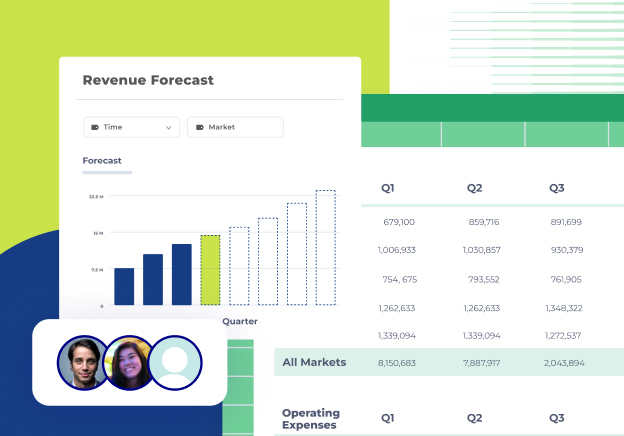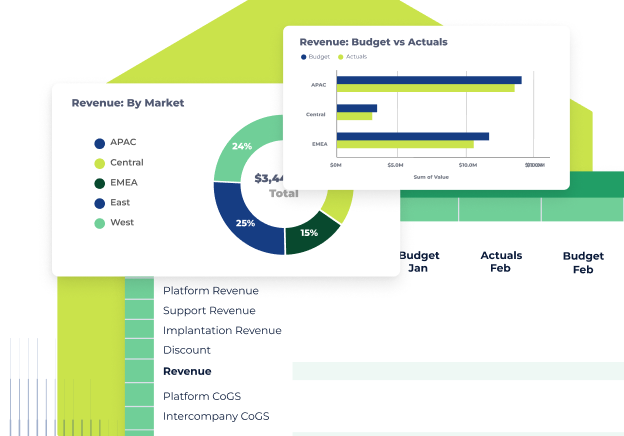Without strong relationships and trust, our expertise can only go so far. It's not enough to know the numbers—we need to communicate them effectively and earn the trust of our colleagues to make a real impact.
Cube's Jim Bullis and Fresh FP&A's Chris Ortega teamed up for a webinar where they shared their top tips on how to do just that. Today, I'm excited to pass those insights on to you so you can build the relationships and trust needed to truly influence your organization.
Happy planning,
Christina
|
Building strong relationships across your organization:
Key strategies for finance leaders |
1. Simplify the language.
Effective communication starts with simplicity. When we remove the jargon and speak in terms everyone can understand, that's when we bridge gaps and start building connections.
"Keep it simple. Keep it short. Use words that the business can understand," says Chris. "If you're going to talk about revenue to a salesperson, consider talking about opportunities if that's the basis of what they're compensated for. Make sure you change your language to suit the audience that you're talking with."
|
2. Tell a story with your data.
Numbers can be pretty dry on their own, but when you turn them into a story, they start to come to life. By working with team members from other departments, you can gather the background info that makes your financial data relatable and engaging. Plus, this teamwork helps build stronger relationships across the board.
"Collaboration is big when it comes to storytelling," says Jim. "Meeting with HR or sales or marketing can help you gather the narrative that's supporting your financial data directly from the source. If you're crafting your narrative with the background from those team members, they feel good when you're presenting the data to stakeholders because they have a common understanding of what you're saying."
|
3. Communicate consistently.
Don't just connect when there's bad news—consistent communication builds trust and ensures that everyone is on the same page. Schedule regular touchpoints with your non-finance colleagues to keep them informed about financial statuses and changes, or to simply offer your help.
"Most non-finance professionals are not used to finance helping them. They're used to finance saying, 'Stop what you're doing. You're overspending,'" says Chris. "If you can go to the business and say, 'Hey. I don't have anything bad to say. You're not over budget. I'm just curious how I can help you,' it can open up so many great learning opportunities and build stronger partnerships. So keep those meetings on your calendar!" |
4. Practice active listening.
Active listening builds trust and respect, showing your colleagues that you value their contributions and are genuinely interested in their perspectives.
"Good leaders are folks who are not only actively engaged in listening, but they're documenting those concerns," says Jim. "They're confirming that they have all the information right at the end of a meeting. Then they're able to follow up, and where needed, build a plan and execute against it." |
5. Be transparent.
Transparency is key to building trust. Share information openly with colleagues from other departments, including the challenges and decision-making processes. Being transparent about your actions and decisions helps build a foundation of trust and understanding.
"The worst thing that you can do is try to know something and talk about something that you have no insights around. It's the easiest way to break that trust and harm your relationships," says Chris. "It's much better to say, 'I don't have the answer to that. Who can we bring in?' Or 'How can we figure this out together?' Or 'What resources do we need?'" |
6. Show empathy.
Empathy involves acknowledging the challenges and pressures that other departments face. By understanding and empathizing with their situations, it creates a sense of connection and mutual respect.
"When someone comes to you saying their team is drowning and needs more headcount, empathize with them and help them build a solid business case," says Jim. "This way, when you go to the board, you have all the background information. It's about teaching them how to ask for help properly, which makes the whole process more collaborative." |
Want to learn more about how to build strong relationships?
Watch the full webinar on-demand. |
What other content would you like to see from us? |
We want to hear from you!
Send us your ideas and get a free coffee. |
Essential reads: The key to strong connections |
1. Top 8 ways CFOs can inspire trust |
The basis of every strong relationship is trust. For CFOs looking to build relationships, earn respect, mend interdepartmental ties, and energize employees, this article from CFO Magazine is full of great tips to help you get started. |
2. Build stronger relationships: The essential guide for finance leaders
|
Building trusted relationships is key to our success, especially when things get tough. This guide from GrowCFO is packed with tips on strengthening those important connections with your colleagues and stakeholders. I recommend checking it out! |
Join the exclusive Slack community made for finance experts like you! |
Share best practices, connect with like-minded finance professionals, find new opportunities, and geek out. |
|






.png)








.png)

-1.png?upscale=true&upscale=true&width=545&name=Meta%20image%201200x675_%20Building%20strong%20relationships%20(1)-1.png)


